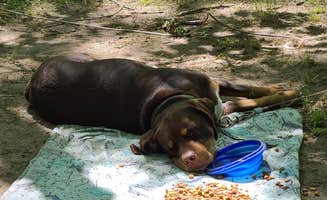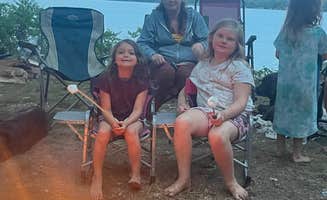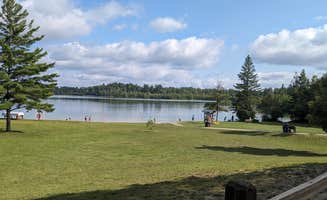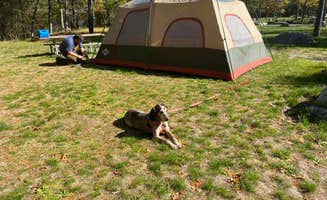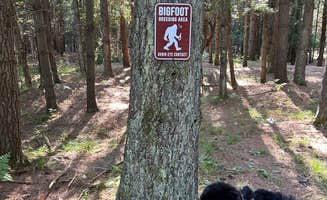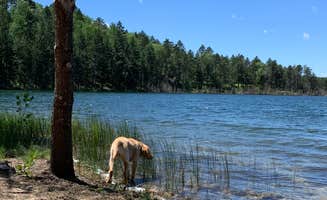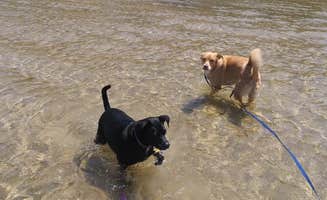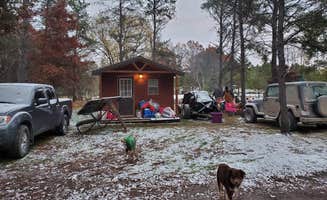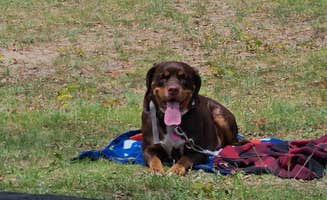Dispersed camping is permitted throughout the Huron-Manistee National Forest near Glennie, Michigan, where elevations range from 750 to 1,000 feet above sea level. The area experiences distinct seasons with summer temperatures averaging 70-80°F during the day and 50-60°F at night, while winters bring significant snowfall suitable for winter recreation. Most dispersed camping areas require visitors to set up at least one mile from developed recreation sites and 200 feet from water sources.
What to do
Hiking along sand dunes: Explore the unique terrain of sand dunes along the AuSable River. The Lumberman's Monument Visitor Center offers access to dunes and educational programs. "Just a mile or two walk to the dunes overlook where you can descend a 100+ ft sand dune down to the water and go for a swim. Be sure to take the forest observatory trail on the way and learn a bit about the history of the area," notes Max O.
Winter backpacking: The forest trails remain accessible during winter months, offering a different perspective of the landscape. "We walked this trail for 5 days and 4 nights. Cell service was spotty, which was the goal. Lots of wildlife and great views. You need to carry everything out that you carry in," reports Megan C. about trails in Huron-Manistee National Forest.
Kayaking and canoeing: The Rollways Campground provides direct access to the AuSable River with kayak shuttle services available. "What's really awesome about this place is if you pay a little extra, they will provide dropoff and pickup of both your party and all your kayaks to the appropriate points so you don't have to deal with transporting everything yourself," explains Kelsey P.
What campers like
Spacious, private sites: Pine River Campground offers generous campsites where "you don't feel like you are on top of other campers," according to John H. This rustic campground provides a more secluded experience for tent and RV camping.
Backcountry camping options: The Hoist/Reid Lake Areas feature designated backcountry sites accessed by hiking trails. "It is such a great weekend hike to some beautiful backcountry scenery. Not heavily trafficked, and most of the campsites have a pretty decent set up from past campers," shares Kate K.
Lake access and fishing: Many campers appreciate the natural lakes in the region. "The lake has an island in the middle and is great to explore by boat. Not sure how much there is to do without watercraft, as there's just a really short trail," mentions Amber A. about Jewell Lake Campground.
Consistent campfire policies: Most dispersed areas allow fires in established fire rings only. "Sites are clean and kept up. All access to trails, lakes and the river are close and easy to get to," notes Jessika A. about camping areas in the region.
What you should know
Limited cell service: Prepare to disconnect when camping in this region. "Cell service was spotty, which was the goal," mentions Megan C. Most campgrounds have minimal to no phone reception, requiring advance planning and offline maps.
Varying bathroom facilities: Alcona Park offers more developed facilities while rustic areas have vault toilets or none at all. "The lots are huge. Some years are better than others with upkeep of the grounds and bath house," reports Summer K.
Seasonal availability: Many campgrounds operate from May to September only. When planning pet-friendly camping near Glennie, Michigan in early spring or late fall, check operating dates as smaller campgrounds like Pine River Campground typically close by mid-September.
Water access challenges: Water levels in the AuSable River and connected lakes fluctuate seasonally. "The water is super clean and crystal clear...and usually sand or rock bottom," notes Dave V. about nearby lakes, though access points may change with water levels.
Tips for camping with families
Observation towers and educational opportunities: The Rifle River Recreation Area features an observation tower and fishing pier perfect for children. "There is a really nice observation tower and fishing pier on Grebe Lake. You can't keep the bluegills and sunfish off your hook," recommends Dave V.
Wildlife viewing spots: Several campgrounds offer excellent wildlife viewing opportunities. "We were fortunate enough to see mink, beaver, muskrat, loons, eagle, osprey and three swan...so it was a treasure trove for us," shares Dave V. about the Rifle River area.
Kid-friendly beaches: Some campgrounds maintain designated swimming areas. "Lots of things to do in this area! The busy, but clean, friendly and quiet. Hiking trails and a playground for the kids," mentions Becky K. about Alcona Park.
Campsite selection for families: Choose sites away from river edges if camping with small children. "The campground is nice and clean with a good amount of space between sites," notes Kelsey P. about Rollways Campground, making it suitable for families needing space.
Tips from RVers
Electric hookup limitations: Most forest service campgrounds near Glennie offer limited or no electric hookups. "For $22/night, it's not horrible, but there is a five night minimum stay in the summer... They do have a full hookup area that is nice," explains Stephanie C. about Alcona Park's options for RVers.
Dump station availability: RVers should note locations of dump stations as they're not available at all campgrounds. "Nice campground in the forest. Only a couple other campers so it was really quiet... Only draw back having an RV is there is no dump/fill station so keep that in mind before you arrive," advises Alex H.
Site leveling challenges: Be prepared for uneven sites in more rustic campgrounds. "Rustic sites could be a little more leveled off but not awfully bad. They have full, semi and rustic sites," notes Ralph E. about camping in the area, suggesting bringing leveling blocks for RVs.



